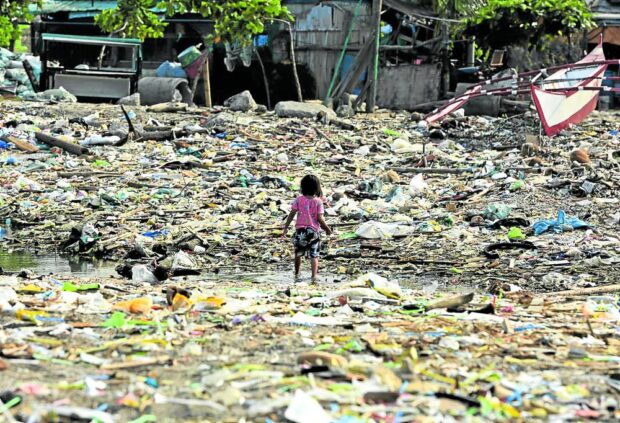DENR gets $278M for marine protection, drive vs plastic waste

COASTAL CLEANUP | A child plays amid garbage on Baseco beach in Tondo, Manila, during the International Coastal Cleanup Day in this photo taken in September 2023. (File photo by RICHARD A. REYES / Philippine Daily Inquirer)
MANILA, Philippines — The Department of Environment and Natural Resources (DENR) said it has secured a total of $278 million worth of grants for plastic waste management and marine protection projects.
This subsidy will serve to enhance efforts among local government units (LGUs) in carrying out those projects in the next five to six years, the DENR said in a statement on Tuesday.
“Through strategic partnerships with multilateral and bilateral institutions, we can address environmental issues efficiently and effectively,” Environment Secretary Maria Antonia Yulo Loyzaga said in the statement.
One such project is the Enhancement of Marine Litter Management in Manila Bay, which focuses on strengthening environmental protection efforts and raising awareness on marine pollution in the bay area.
Another is the Green Economy Program of the Philippines, aimed at solid waste management and plastic waste reduction in 60 LGUs.
Australia, Canada, Japan, South Korea and the United States were among the countries that provided the grants.
Among the international institutions that will serve as Manila’s partners in these efforts are the European Global Environment Facility, United Nations Industrial Development Organization, and the European Union.
The DENR also has a partnership with the World Bank on assessing municipal solid waste plans.
‘Sachet economy’
According to a 2021 report by the World Bank, the Philippines generates over 2.7 million tons of plastic waste a year, mostly unrecyclable, single-use sachets, of which 20 percent pollute the seas.
According to a 2015 study by the University of Georgia, the country is the third largest generator of mismanaged plastic waste after China and Indonesia.
Plastic use, however, is vital to the economy. Data from the World Bank also showed that the plastic industry in 2018 contributed more than $2.3 billion to the Philippine economy.
But the country’s “sachet economy,” according to some estimates, leaves a staggering waste of 163 million pieces of sachets a day.